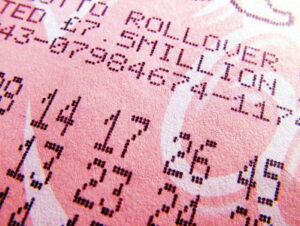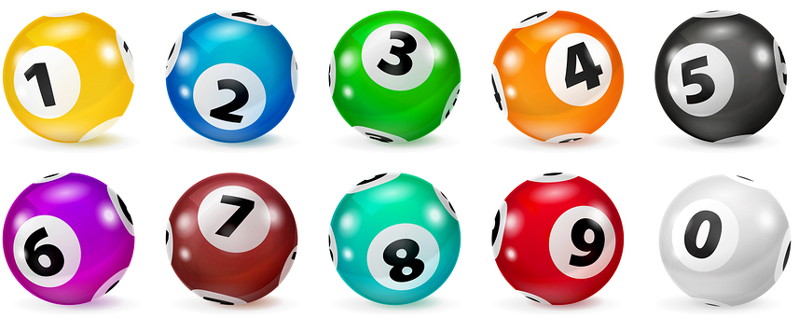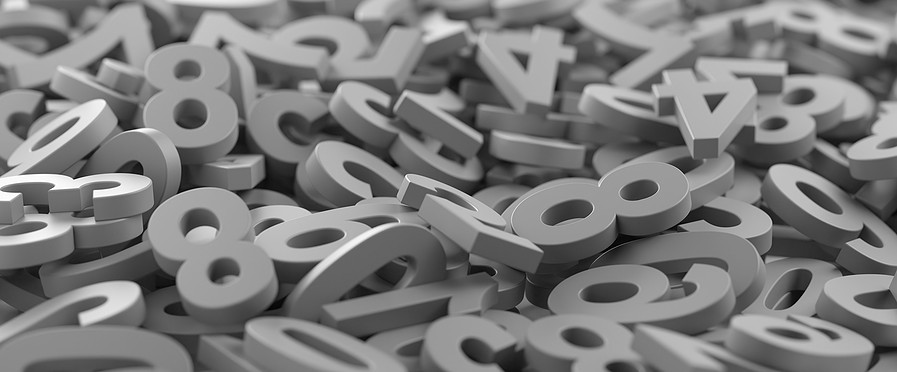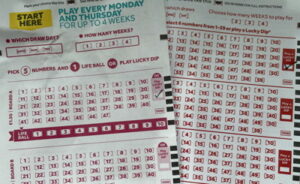 Playing The National Lottery is one of the most exciting ways to participate in gambling. It doesn’t take more than you simply buying one or more tickets and then waiting for the numbers to be drawn. Of course, the lottery draws, and the lottery games have changed since The National Lottery first became active in 1994. Back then, there was just a single lottery draw that took place per week. This required players to select six numbers per line for their ticket, with each line costing £1. Today, a line costs £2, with those rules changing in 2013.
Playing The National Lottery is one of the most exciting ways to participate in gambling. It doesn’t take more than you simply buying one or more tickets and then waiting for the numbers to be drawn. Of course, the lottery draws, and the lottery games have changed since The National Lottery first became active in 1994. Back then, there was just a single lottery draw that took place per week. This required players to select six numbers per line for their ticket, with each line costing £1. Today, a line costs £2, with those rules changing in 2013.
Since 1994 though, multiple other lottery games have been introduced to The National Lottery, including the Thunderball, Lotto Hotpicks and EuroMillions, amongst others. Collectively, they have paid out a vast amount of money to various winners and have also donated plenty of revenue to good causes and projects throughout the United Kingdom. While some lottery games have come and gone, others have remained active since the earlier days.
One such feature of these lottery games is the possibility of opting for a Lucky Dip. Through this, rather than choose your own numbers for your ticket, you can request one or more lines to be randomly selected for you. This prints random numbers on the ticket lines for you, serving as a route for those who do not wish to select specific numbers to take. But how exactly do these Lucky Dips work? How are the numbers chosen for you and have any issues arisen with this particular method of playing the lottery before?
How Does a Lucky Dip Work?
 Whenever you want to participate in a National Lottery game, whether that be Lotto, EuroMillions, Thunderball or HotPicks, you have the option of selecting your own numbers or opting for a Lucky Dip. This serves as a randomly-generated entry, and the lottery terminal (or online site) selects the numbers for you. You can also engage in a similar option when playing the Health Lottery too, but it goes by the name of the Quick Pick.
Whenever you want to participate in a National Lottery game, whether that be Lotto, EuroMillions, Thunderball or HotPicks, you have the option of selecting your own numbers or opting for a Lucky Dip. This serves as a randomly-generated entry, and the lottery terminal (or online site) selects the numbers for you. You can also engage in a similar option when playing the Health Lottery too, but it goes by the name of the Quick Pick.
How does it all work? Well, Lucky Dips utilise a pseudo-random number generator (PRNG), which also goes by the name of a deterministic random bit number generator (DRBNG). This serves as an algorithm which generates number sequences. These sequences are very much close – although not completely – random. Why is this? Well, because the generators themselves rely on specific formulas in order to create those randomly appearing numbers. That being said, they have become exceptionally good at introducing approximate random lines. Furthermore, they are frequently tested by independent organisations to ensure they are as close to random as possible.
One thing to point out here as well, just for your own knowledge, is that if you manage to match two numbers when playing the Lotto game, you’ll win a free Lucky Dip ticket in a future draw. That adds a bit of extra incentive into playing.
Can it be said that these Lucky Dips are actually random, though? Well, looking back at the 2010 study done by the Centre for the Study of Gambling at the University of Salford, it was discovered that there was no inherent bias when it comes to the numbers generated by Lucky Dips for players. This study was done on the UK EuroMillions Lucky Dip entries, and it would seem like the Lucky Dip lines are very much random.
It would seem like the PRNG being utilised by Camelot, who run The National Lottery, does not recognise any sort of patterns. Furthermore, if patterns were in place, then it would not be able to commit these to any sort of memory. Instead, it utilises a set formula, which generates each Lucky Dip number line. Through this study, it was found that similarities in numbers and/or sequences on a purchased Lucky Dip ticket were completely coincidental.
That being said, in 2014, a study was done by ThisIsMoney, which brought forth a slightly different opinion on the matter. In that study, the supposed random Lucky Dip ticket bought by a player produced two rows with three numbers that were exactly the same on them. Within that investigation, Camelot was asked about how its Lucky Dips were run. The response remained the same – that the software used to pick the Lucky Dip numbers has been designed so as to select numbers completely randomly.
Essentially, each line on such a ticket is generated separately to the rest. And because the software is designed so as to have no memory of the previously chosen numbers, it is completely coincidental that at times, two or three of the same numbers will be selected on a single ticket in different lines.
Are There Any Benefits to Playing with Lucky Dip Tickets?

Most people tend to think that when they’re selecting numbers on a lottery ticket, the numbers that they choose are unique. And this is because people don’t look beyond familiar numbers to them. This is why it’s so common for birthdays, wedding anniversaries, house numbers and so on to be utilised by players as their selected numbers. However, there are millions of people in the UK who play the lottery, and a vast majority of them tend to play in the same way. Masses of people will have been born on the same day as you, for example.
This does limit your chance of winning big as a result, because if the numbers you’ve chosen are winners, you’ll have the payout split between all people who have chosen those same digits. For example, if everyone who was born on October 21, 1976, chose to play the numbers 10 (October) 21, 19, 7 and 6, as well as an additional sixth number with meaning, then a prize for those numbers would be distributed amongst everyone. At the same time, this means that higher numbers are less-frequently chosen, as months don’t have more than 31 days in them.
While picking your own lottery numbers may make it seem a little more personal, going for the Lucky Dip instead brings its own advantages. It’s a lot less likely that if you do possess a winning ticket, you won’t have to share the winnings with as many people. That’s because the numbers have been generated completely at random and you’re more likely to have higher numbers on the ticket, too.
Lucky Dips are also highly convenient because you do not have to spend your time analysing number trends or looking for them. Instead, you simply request the Lucky Dip and then wait for the computer to generate the numbers on the ticket. And that’s it.
Another benefit of lucky dips is you do not feel ‘locked in’ to playing in the same way you would if you chose to play the same numbers every week. This means if you want to stop playing or just skip a week you can do this if you play lucky dips without worrying that your numbers might come up, as you don’t know what numbers you would have had in the first place.
Disadvantages Of Lucky Dips

It’s not only advantages that can be considered when it comes to Lucky Dips, though. These tickets also have their own downsides that you need to consider. You only need to look back to March of 2018 and the case of Nathan Moody to realise this. The player from Billingham in County Durham purchased a Lucky Dip ticket to participate in a Saturday Lotto draw. This was bought from the nearby corner shop, and when he returned there to check his ticket, he was informed that he had won a large reward from it. The corner shop informed him that the payout was too big to come from the corner shop, and that he should contact The National Lottery directly.
Moody was understandably very happy with the information and began planning a family holiday abroad – his family’s first. Speaking with The Sun, the player said that the machine in the corner shop had made a beeping noise stating that he had won, and the shop assistant within was highly shocked at it. He waited until around 11pm that day to check the lottery app on his phone, and when he did so, it informed him that he had a free Lucky Dip. He was expecting a £50,000 prize though, considering the Low Grange corner shop had appealed on its Facebook page for a winner to come forward and collect that prize.
According to the official outcome, Moody had had his Lucky Dip ticket scanned during a so-called “draw break”. This is a period directly after a draw where numbers and prizes are being worked out by Camelot. Moody returned to the shop the following day and said that it beeped once again, but only provided him with a free Lucky Dip.
Camelot commented on the result, saying that until the “draw break” is over with, no prizes can be handed out to players. According to the spokesperson The National Lottery terminal within the corner shop will have made a noise, but would have displayed the following message: “Results not in. Return ticket to player and tell player to check another day”. Unfortunately, he was given false information by the shop assistant.
Lucky Dips A Better Option?
 Statistics relating to Lucky Dip tickets when compared to players choosing their own numbers shine a positive light on things. A Lucky Dip generally makes more sense when you consider all of the variables anyway, but the stats also back up this particular choice as providing more of a chance of winning. While it may be true that some people believe they have come up with a strong system for winning by using their own numbers, there’s a strong choice that others will be using the exact same system.
Statistics relating to Lucky Dip tickets when compared to players choosing their own numbers shine a positive light on things. A Lucky Dip generally makes more sense when you consider all of the variables anyway, but the stats also back up this particular choice as providing more of a chance of winning. While it may be true that some people believe they have come up with a strong system for winning by using their own numbers, there’s a strong choice that others will be using the exact same system.
Of the total number of people who have participated in the lottery over the years, only 11% of them have won big with numbers that they have chosen and stuck with. On the other hand, 53% of all winners have achieved such victory thanks to them purchasing Lucky Dip tickets. This means that more than half of the winning tickets from The National Lottery draws have come from random lines generated by Camelot and its Lucky Dip process. This suggests that if you opt for anything else, your chances of winning are reduced.
Even though the chances of winning via a Lucky Dip ticket seem higher, it is important to remember that in any lottery game, the odds are stacked against you in general. With 59 balls in the draw machine and only six numbers per line on your ticket, the chances of winning stand at 1 in 45,057,474. Furthermore, previous draws have exactly zero influence when it comes to future draws.
Then again, some people will stick to choosing the same numbers as they have always done. They’re obviously convinced that one day those numbers will be drawn out.
It’s clear to see that the numbers involved on Lucky Dip lottery tickets are generated almost totally at random. However, it cannot be said that they are completely 100% random – they just generally look quite random. The formula that the software follows is designed so that it doesn’t remember the lines of numbers that have been generated before. While patterns cannot be learned or utilised by the Lucky Dip software, they do seem to present gamblers with more of a chance of winning the game they’re playing.